SOUTHEAST ASIA
Over 500 young leaders—women on the margins of mainstream non-governmental organizations (NGOs)—have built national and regional networks across movements and borders, mobilizing thousands around an agenda of Freedom of Expression. They operate with minimal resources and maximum love and creativity. Their story is one of long-term investments in building power within, then building power with. Now, because they possess a strong foundation in grassroots organizing and popular education processes, they are poised to really shake things up.
-
Situating the Story
In 2006, financial crises, conservative social and religious agendas and an increasing focus on military security were among the powerful forces affecting women’s basic rights and livelihoods throughout Southeast Asia (SEA). Unchecked corporate-led globalization was transforming traditional communal social systems and replacing them with more individualistic consumer-oriented economies, resulting in economic instability, and further weakening the social fabric and resilience of communities. In response, well-resourced NGOs—mainly Northern-based, with little or no knowledge of, or roots in SEA—emphasized technical and policy fixes over transformative change strategies. Policy advocacy and campaigning often occurred at the expense of grassroots organizing and constituency-building strategies. In addition, little effort was made to prepare the younger generation for leadership, thus leaving young people with few of the resources, skills, and connections necessary to make an impact.
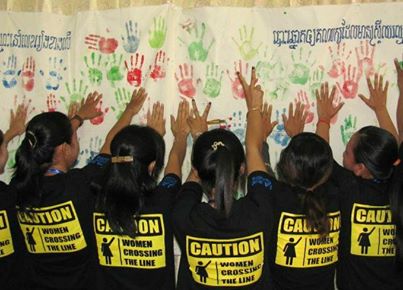
-
Challenge
Young Women’s Organizing – Disconnected & Neglected
In 2007, JASS launched a movement-building initiative in SEA led by Indonesian co-founders and feminist popular educators, Nani Zulminarni (PEKKA) and Dina Lumbantobing (PESADA), both renowned for their pathbreaking work linking extensive grassroots organizing with advocacy at local and national government levels. Nani and Dina had spent years supporting young women and had discovered some common trends: youth movements were rare, and the few that did exist did not recognize women’s important role in defending their rights. Support for young women was especially lacking.
+ Read MoreYoung women’s organizing often transpired in isolation, with few links to broader political agendas, or to previous generations of women activists and their experiences and expertise. Those NGOs that supported “young women’s leadership” generally conducted one-time trainings focused on the individual rather than building the kinds of leadership and collective citizen power needed to influence social and political change. Young women were keen on being active social change agents, but they lacked the deep political consciousness, connections, and organizing skills required to address common needs and to advance their rights.
Based on Nani and Dina’s analyses, JASS saw an opportunity to equip young women with the confidence and skills necessary to be more effective organizers. We decided to focus our work in SEA on building young women’s political leadership capacity, bridging the gap with older generations of women activists, and providing spaces for exchange and learning.
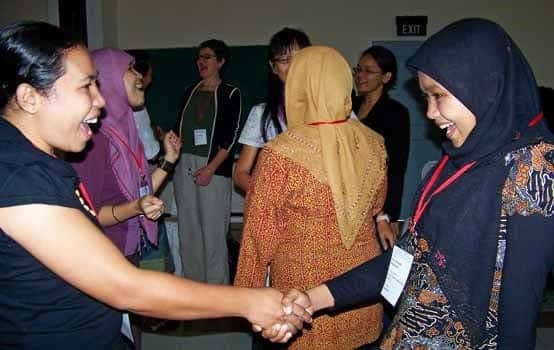
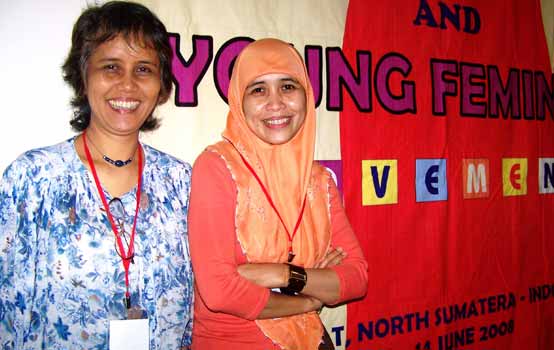
Choice
Cultivating the Capacity of Young Women Activists
Building on Nani and Dina’s relationships and history with young women grassroots activists from Indonesia and Timor-Leste, JASS decided to convene our first Movement Building Institute (MBI) with 34 young women in 2007. Some of these women had been part of Nani and Dina’s capacity-building workshops, mentorship, and accompaniment from 2001-2005. We chose activists from Indonesia and Timor-Leste given their shared language and legacy of painful historical divisions.
+ Read MoreJASS MBIs are participatory processes that re-energize women’s collective leadership and shared capacity to define, lead and advance sustainable change. They provide safe spaces where women can critically examine their lives and contexts. Through popular education, they enable women activists to identify injustices affecting their lives, deepen their political analyses, and to build trust and solidarity across differences of identity, age, issue-focus, location, etc. and their underlying causes. As personal and political relationships emerge, women begin to define a shared change agenda and to develop coordinated strategies and alliances.
Strengthening young women activists’ leadership and organizing capacity required a dual strategy that both developed individual capacity and confidence, and built collective strength and organization. We would identify and engage with young women already active in community organizing, whether in women’s rights or within other social justice organizations. We believed that by investing in individual young activist leaders, they could play a larger role within their organizations and bring a feminist perspective to the organizing and strategizing they were already doing. In Nani’s words, “If you are an activist, a movement person, it doesn’t matter where you are. JASS wants to invest in leadership of women who can really build a movement to make a change, rather than form NGOs. JASS wants to create a space where you – young and energetic, with a vision – can build your character, leadership, and capacity to contribute to change.”
We had three goals for this SEA Movement Building Institute: 1) offer intensive training to provide young women with the tools to unpack, understand, and navigate power in their lives and to address and improve their work on the ground; 2) build a sense of sisterhood, belonging, and solidarity among the young women; 3) prepare a select number of women to participate in a regional MBI which would include young women and seasoned activists from other countries.
Change
Initial Exposure to Feminism – We Need More!
The MBI was an emotional moment of coming together in a rare women-only space, and sharing similarities and bridging painful historical divisions. The diversity of the participants enriched and sharpened the substance of discussions, particularly on traditionally taboo issues, such as LGBTQI people, and religious and local customary law. For many participants, this MBI was an inspiring first exposure to feminism. It generated demand for further training in community organizing, popular education, and feminism. A specific interest emerged for an intergenerational dialogue to enable young women to build more effective ties with seasoned feminists.
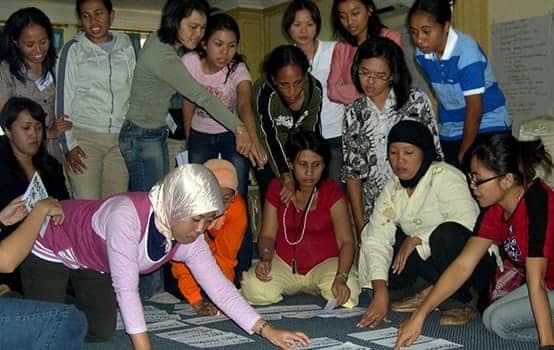 + Transcript/Transcripción
+ Transcript/TranscripciónWhen we started doing the MBI [movement building institute] with SEA – it was 2007 – we thought there was a gap between generations. A generation who – women’s leadership, women organizers, women’s movement – is more led by senior women activists. Also, at that time we did a lot of development in terms of contact chains and context in SEA. The changing of the context and the women’s movement, the growing of the women’s movement is not as fast as the context is changing in the region. And also there is a generation gap in the women’s movement at that time, so we thought JASS could contribute in filling the gap, not only the generation gap but also the gap in the women’s movement in terms of rural and urban and also people living close to the center of the government system with other women who are far away. So the initiative to start movement building in the region is to contribute to filling the gap that existed, that was occurring, during that time. ~ Nani Zulminarni, PEKKA, Indonesia
My starkest realization was that women in other countries suffer almost the same injustices as women in my own country [the Philippines]. This realization prompted me to seek more ways to forge ties with other countries from different regions, in order to strengthen the impact of our advocates and to build bridges for different forms of exchanges and alliances in the future. ~ Rosanna "Osang" Langara, Philippines
Caja de herramientas
-
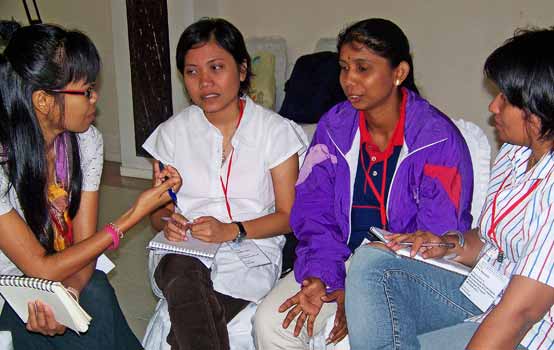
Challenge
Bridging the Gap between Younger and Older Activists
Generational gaps were a serious issue for the region. In Indonesia, for example, a gap existed between “celebrity” feminists—older, urban and more established NGO leaders—and the younger emerging generation of organizers and feminists. This divide caused tension and fragmentation in the women’s movement. While older feminists had a wealth of experience and knowledge, they were not cultivating the younger generation’s political leadership capacity or tapping into their knowledge.
+ Read MoreJASS believed that bridging this and other divides would prove strategically vital for women’s movements going forward. We decided to convene an intergenerational dialogue in tandem with a follow-up training workshop for young feminists from the initial MBI. Our goal was to break the idea that only seasoned feminists had knowledge to share, and that only their “knowledge” had legitimacy, and to forge more diverse and crosscutting feminist leadership.
Choice
Connecting Women across Many Differences
In 2008, we convened the first 5-day regional MBI in Parapat, North Sumatra, which brought together 22 activists and organizers from eight Southeast Asian countries (Cambodia, Indonesia, Philippines, Myanmar, Thailand, Timor-Leste, Vietnam, and Malaysia). The participants were identified through conversations with national women’s groups and regional networks. Younger and older participants explored the history of women’s movements in the region, mapped the current context, and discussed opportunities for connection across borders, ethnicities, religions, cultures and generations. These exercises kicked off a long-term learning and action process to diversify, strengthen, and build connections among women to advance a feminist, justice, and development agenda over 3-5 years.
+ Read MoreIn the same year, we also facilitated an Intergenerational Dialogue to address the gap between high-profile national-level feminist leaders and the younger generation of activists and organizers. The intergenerational dialogue gathered 42 young and senior feminists working on higher policy as well as at the grassroots levels on a range of issues. This dialogue was important not only because the young women had requested it, but also because young women needed to be equipped with the confidence and skills to put forth their voice, knowledge and value within their organizations, where experienced feminists tended to dominate.
As a starting point, the facilitators engaged the group in building a timeline on the wall to review the history and dynamics of each historical era, and the challenges and successes of women activists in each period. Then, moving to the present, participants detailed and clustered the biggest issues women were working on—from domestic violence to migration. Young and senior feminists reflected on the incredible breadth of work undertaken and energy invested by women activists, and their continued efforts to forward a range of rights agendas. Pivotal questions were introduced regarding fragmentations within and the sustainability of the women’s movement. In the end, everyone in the room acknowledged the need to bridge divides. They concluded that, “the rainbow strategy of diversity turns out to be a strength.”
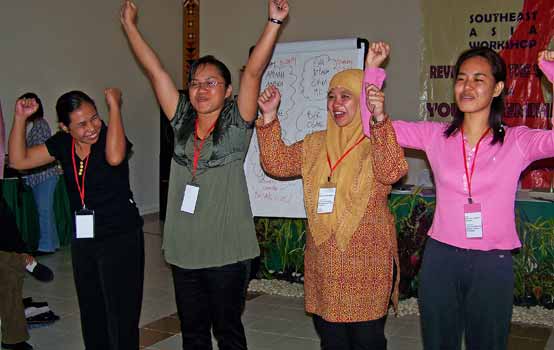
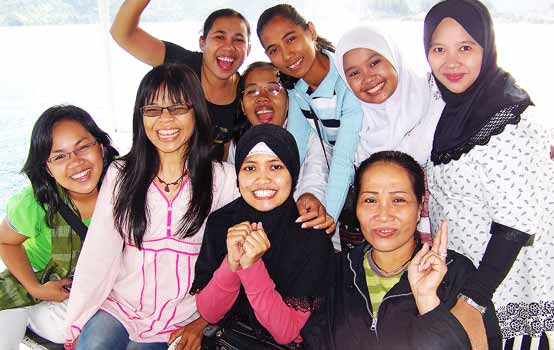
Change
Shared Analysis, Growing Trust
The regional MBI resulted in a dynamic engagement of new faces and perspectives on burning issues such as poverty, labor, sexuality, and trafficking. We used JASS’ signature power framework to enable women to better understand how power operates in their lives and as a lens for “reading” the world. Using an iceberg illustration, participants could see that visible power (e.g. legislative and institutional power) was just the visible “tip” of the power dynamics that impacted their lives. Beneath the surface were the dynamics of hidden power (the influence of powerful actors such as churches, corporations, the elites), and invisible power (cultural practices and norms that shape how we think and act).
+ Read MoreParticipants also learned about alternative forms of power (power within, power with, power to, and power for), which encouraged them to shift their perception of themselves as powerless, to see themselves as visionaries and leaders of change. This discussion also uncovered common challenges they were facing and wanted to act on: sexuality and sexual rights, migration, violence against women, and women’s rights within broader human rights agendas.
JASS is my Home
Creating a space of trust for diverse young women, in particular, LBTQI women, was vital. Through a more relaxed evening session, participants were able to open up, share personal stories, and discuss sex and sexuality. How does a woman have sex with another woman? Is sexual orientation a choice or something we were born with? These were some of the traditionally “awkward” questions women felt comfortable exploring. The openness fostered within this safe space allowed other women to learn about the issues faced by LBTQI women, and affirmed that “being LBTQI was normal,” as Maria Mustika, an LBTQI activist who participated in the process, explained.
+ Transcript/TranscripciónAt the time, I had that experience when we conducted the first dialogue – [inter]generational [dialogue], but that was not with FAMM, but still with JASS Indonesia. [It was] where we invited all the huge big-time women activists in Indonesia and then we created the space to have a dialogue. But it’s not a dialogue – it’s like only promoting the activisms in past years before we came in. They’re very Jakarta-[centric], which [means] the movement [is] only in Jakarta. But we aren’t only in Jakarta, the capital city. We come from other provinces, the rural areas. So, the method that we used at the time with the first [inter]generational] dialogue [did] not work. So that’s [why] I think this approach, this kind of method to get us involved with the older [generation] [will] not work if they are not coming from ourselves, our generation. So with FAMM, we changed that method. We picked up and selected the [senior] women activists who also work longer in the grassroots level, because most of us are coming from the grassroots level as organizers. I just think [that what we did] in the first [inter]generational dialogue – that’s not gonna work.
I learned that I am not alone – I have so many sisters and suddenly all of their problems become mine and mine become theirs. Recently, an activist friend of ours was jailed because the government was trying to silence her. It became all our fight, and our voices together got her released. ~ Maria Mustika, Indonesia
Caja de herramientas
-
Challenge
Difficulty of Connecting Across Cultures and Overcoming the Dominance of Seasoned Feminist Activists
At the regional and country levels, two notable and emerging challenges became apparent in SEA’s processes:
+ Read More- Connecting Across Cultures: Holding regional processes was a challenge given the distinct nature of SEA countries and contexts, from their diverse political histories to the resulting differences in each countries’ women’s movements. For example, the women’s movement in the Philippines was more developed than in Cambodia, where the legacy of oppression during the Khmer Rouge was still fresh. Contemporary Philippine women’s activism and movements date back to the struggle against the Ferdinand Marcos dictatorship in the 1980s, and as far back as the early 1900s. In Cambodia, while women’s NGOs began to be built in the 1990s, the discussions on women’s activism and feminism are only recently starting to take shape. Each country also had its own language, so going deep was difficult without expensive simultaneous translation.
- Overcoming the Dominance of Seasoned Feminist Activists: While young feminists appreciated what they had learned from the intergenerational dialogue, overall they felt that the voices of senior feminists had dominated discussions and seemed reticent to engage with the younger generations. As one participant expressed, “Wow, these ‘celebrities’ just come and go. They don’t want to listen to us.”
Despite this setback, the dialogue was still considered successful on three fronts:
- Bringing together women from different generations who work at policy, grassroots and other levels on a range of issues;
- Generating a shared understanding of the history and dynamics of each historical era, and of the challenges and successes of women activists in each period; and
- Detailing and clustering issues and challenges, such as domestic violence and migration—some ongoing, others new—and thus moving towards a feminist agenda for Indonesia.
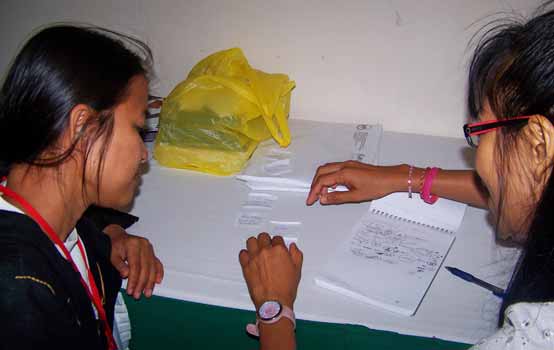
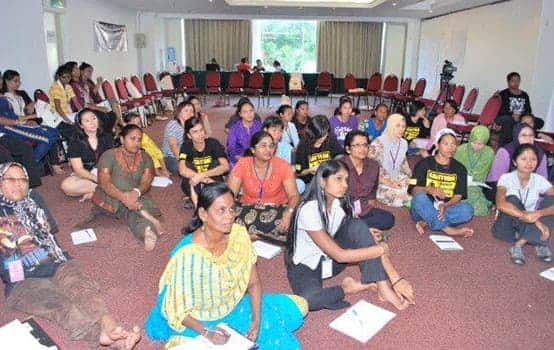
Choice
Go Deep & Forge Ahead
To stay strategic, we made parallel investments in regional processes to build regional analyses, cross-country alliances and solidarity. Yearly, regional workshops were held among the same group of women, which included two activists from each country who took on the role of country representatives responsible for coordinating the work at the country level. Partly owing to the challenges we had in holding intergenerational dialogues and also because of the expressed need of young women to build their “power within”, we made strategic choices along the way:
+ Read More- Diving deep through country processes. We decided that we would continue to build solidarity at regional levels while going deep at national levels. In order to strengthen leadership and organizing capacity to better influence local and national policies and debates, we chose to expand our activist training and organizing processes beyond Indonesia to the national level in Cambodia, Malaysia, and the Philippines. From that point, trainings with women from Indonesia and Timor-Leste were held separately in order to delve deeper into their specific contexts and issues.
- Changes to future intergenerational dialogues. The JASS SEA team took the disappointment from the first dialogue in Indonesia as an entry point, inviting the younger women to define the kind of movement leadership and values they wanted going forward. The succeeding intergenerational dialogues were facilitated by the younger feminists themselves, enabling us to challenge the established style (presentations by “celebrity” feminists), and instead invite a true inclusive exchange. We also decided to invite more seasoned grassroots organizers (not urban-based) who were more embedded in the grassroots levels we were trying to reach and impact.
- Invest in young women. It was important to ensure that the process and methodology of the intergenerational dialogues was designed to ensure more meaningful participation of young women. And it was equally imperative that parallel investments be made in supporting young women to discover and use their own voice and leadership, and to strengthen their capacity to challenge established styles of leadership, and attitudes about young women within their movements, organizations, homes or communities.
Change
Young Women Become Rebels!
Young leaders were gaining the confidence to confront the injustices they were seeing, and even speaking up within their own organizations and movements. Young women began to hold older, more powerful women accountable. For example, in Indonesia, some of the seasoned activists would call us to say, “What have you done? These young women have become rebels!” We received calls from many directors, complaining about our process, but we kept the dialogue open, trying to redefine what “leader” means.
+ Read MoreAs a result, more organizations began to recognize that they actually had young women in their ranks. Women’s movements that had been, for a long time, dominated by women over 40 were now aware of and working with younger women. This recognition was also a step forward for JASS SEA; we now knew where to find—and network with—young women in the different countries in which we worked. We no longer relied solely on the older generation because we had a base to count on. Some of the young women moved up to become leaders of networks or directors of their organizations, while their former directors became part of JASS, serving as multigenerational resources.
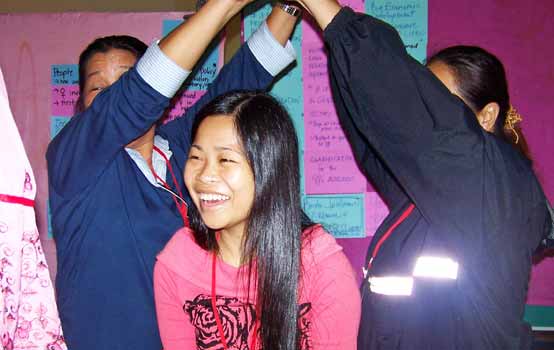 + Transcript/Transcripción
+ Transcript/TranscripciónOther challenges, of course the diversity of our region. We don’t have the same language, English is not our first language and all the countries in this region speak different language and have different culture, so to build the process and involve women from different countries is really challenging. That’s why at the beginning it’s quite slow, the process, we try to find ways to really do it.
The struggle against discrimination and injustice for women is not only a Timor Leste struggle, but a struggle for all women of Southeast Asia and the rest of the world. This motivates us. When I have challenges and struggles in my personal life and my work, and I think I don't have support and don't have anywhere to go, I have JASS. JASS is my family. JASS is my home. ~ Yasinta Lujina, East Timor
Caja de herramientas
-
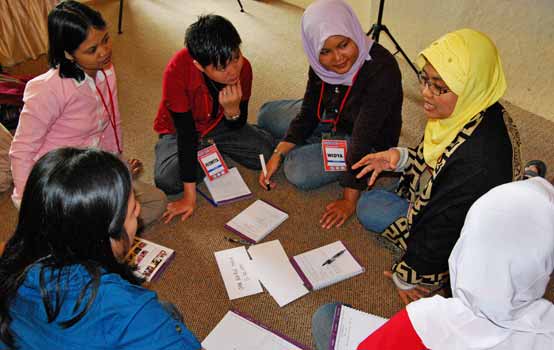
Challenge
Which Young Women?
The intergenerational dialogue affirmed the urgent need to prioritize and invest in young women. We needed to create a space for young women to express their voice and build their capacity to claim their rights, respect, and full participation in decision-making at all levels. We had decided that young women were a priority, but we had yet to clarify our precise focal issue, or to determine which strata of young women we wanted to target.
+ Read MoreYoung women working in urban-based NGOs were already granted some opportunities, while young, rural and indigenous, poor, lesbian, transgender, and/or HIV+ women were overlooked by NGOs. It was precisely these women who were most affected by injustice. These young women were organizing in fresh and creative ways, but with few of the resources, skills, and connections needed to make an impact.
Choice
Focusing on Young Grassroots Women
We decided to invest primarily in building young women’s leadership through participatory training processes, accompaniment, and the creation of safe spaces for dialogue to build trust and solidarity. Our goal was to expand our regional and national training and organizing processes to encourage young women’s active political participation and their contributions to solutions targeting inequality and violence. In addition, we wanted to address the divide between urban-based, professional women’s rights advocates, who often focus on legislative change or academic research, and grassroots organizers, who mobilize women to address basic needs.
+ Read MoreJASS SEA selected an additional group of 24 young activist leaders from 19 Indonesian provinces, including women who were active as farmers and fisher women, indigenous women, workers and unionists, researchers, literacy trainers, or worked in HIV/AIDS support and legal aid, or fought against trafficking. The safe spaces and workshops focused on engaging the ‘invisible power’ (values and beliefs) that shapes norms around women’s status, roles, and a sense of individual agency, while surfacing possibilities for working together. Three of the trainers were drawn from the initial Indonesia group, deepening their own skills as they worked alongside experienced facilitators and mentors to introduce power analysis, to engage in community organizing and communications, and to learn from scholars about feminism. The idea behind this process was to develop and mentor a cadre of young activist leaders who could sustain and multiply the organizing. A second intergenerational dialogue was also held.Because many placed ‘writing skills’ high on lists of requested support, we created an online writing community and training course in Bahasa-Indonesia, with one of the participants—a seasoned writer—leading the process.
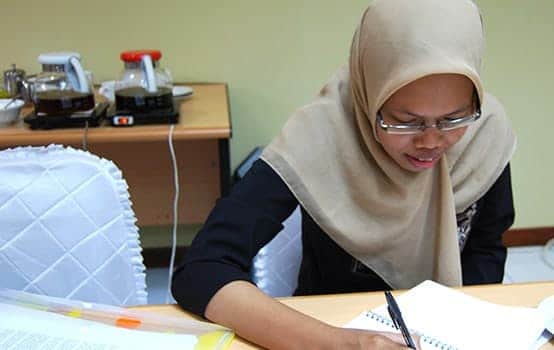
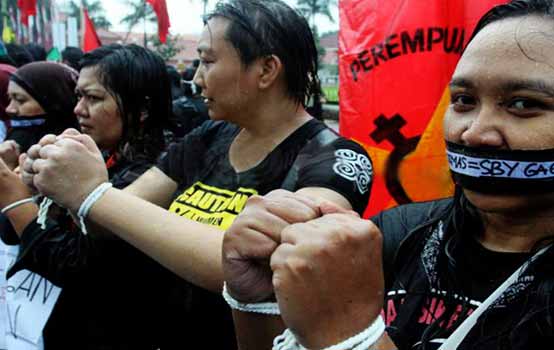
Change
Young Indonesian and Timorese Leaders’ Voices Amplified
In 2009, we set up an online writing community for young women to strengthen their communication skills. Over time, more than 25 women signed up both for the online writing community and a training course carried out in 2010, and the group thrived. They used a listserv and blogs to share and publish personal and political essays on topics such as ‘being a girlfriend or wife,’ sexuality in local culture, domestic violence, the Anti-Pornography Act, climate change and IT for rural women. For most of the young women, lifting the lid on taboo topics of sexuality was revolutionary. Key to this transformation was the use of writing as a powerful tool for voice and visibility.
+ Read MoreThey also made strategic use of communication around Mothers’ and Valentine’s Days to promote women’s political perspectives and participation, since these commemorations are often used to undermine feminist values by glorifying the role of motherhood and strengthening the narrative of submissive young women.
Leveraging Momentum at Country Level
National programs launched in Malaysia, the Philippines, and Cambodia
As the work of JASS was gaining momentum in Indonesia and Timor-Leste, three national-level leadership workshops were held in November 2009, employing JASS tools and drawing on the local “alumni” from previous JASS processes. For each workshop, JASS SEA wove together the elements most relevant to the needs of the particular group and context. JASS teams were consulted widely to ensure diversity of class, focus, location and ethnicity, and to successfully negotiate long-standing tensions in certain countries.
Malaysia: In Kuala Lumpur, JASS partner and popular communications center— KOMAS—hosted 42 participants from many different sectors and communities throughout the country, including prominent indigenous movements, under the theme “Empowering Grassroots Women Leadership.”
Philippines: JASS brought together women across a spectrum of ages, movements and political affiliations, some with deep and historic tensions. The theme for this convening in Manila was “Liberating Filipino Women through the Years” and the local host—the Center for Women’s Resources—served as the key anchor for the initiative.
Cambodia: Twenty-eight participants between 25 and 30 years old from 17 Cambodian NGOs attended JASS’ Phnom Penh workshop, hosted by local training partner SILAKA—an organization that strengthens women’s political participation.
Combining regional networking opportunities with training experience
In our efforts to maintain cross-solidarity, we kept the long-term strategic goal of regional action and impact in mind. As such, we identified moments that combine regional networking opportunities with training experience for the regional ‘alumnae’ – the young women we had been accompanying since 2008.
+ Transcript/TranscripciónWe used the condition and position of being young women, being organizers, being minorities, being marginalized group as the common feeling, the common understanding, common issues and challenges that they face. Then from that we try to touch the way they organize. So we are not focusing on issues, but focusing on the challenges of organizing around the issues. So this is how we find the common ground in the discussion. Then we use the power analysis to see different forms of power that the women have to deal with no matter the issue, the challenges they have to face in the power relations is almost the same: the values, the norms, the cultural practice that control their lives, which we understand as invisible power; they have to deal with government system and policies, they have to deal with all the informal forces that really influence their lives.
Reflecting on all the experiences shared by different women during the forum, I compare their concerns and experiences with those of women in the Philippines. Despite all claims that the gender gap in the country is lessening, the realities experienced by grassroots women tell otherwise. We see this in our work, those of us involved in organizations of women from the urban poor, youth and students: how women farmers are not considered as farmers but housewives still. How urban poor women have to work in contractual jobs with meager pay and are still expected to tend to housework. How neoliberal policies in education have increased the number of out-of-school young women. Yes, in this modern age, the notion that a woman’s place is in the kitchen and the bedroom still lingers. ~ Mikas Matsuzawa, the Philippines
Caja de herramientas
-
Challenge
Tensions and Dynamics
Going deeper in each country brought success in terms of responding to the need for a feminist and movement-building approach, but also uncovered challenges.
+ Read MoreTimor-Leste: The work in Timor-Leste stalled due to multiple conflicts among activists on personal and organizational levels around class differences, generational gaps, lack of accountability, and accusations of using money for personal use. In part, this breakdown arose due to the lack of trained women capable of filling leadership positions. Consequently, young women were often put into director roles without the necessary support and mentorship to help them thrive.
Philippines: In this country, deep political divides were causing conflict among activists. In the mid-1990s, the women’s movement split into several factions aligned with new political parties and in particular, differences existed in the analysis of how best to solve the issues plaguing women’s lives. One faction focused solely on women’s rights and women-only spaces, while the other faction (mainly grassroots-based) believed that women’s issues were not separate from the broader issues, and that the solution should engage everyone, including men.
Malaysia: Moving forward in Malaysia after the initial workshop was difficult because we were not able to develop a firm base of women who could sustain the work. Malaysian participants utilized some of the tools and skills they gained from national and regional JASS trainings to strengthen their work and leadership, but, they viewed women’s rights and building feminist power as side issues, next to the urgency of their work in broader social justice efforts, such as organizing for the rights of indigenous peoples.
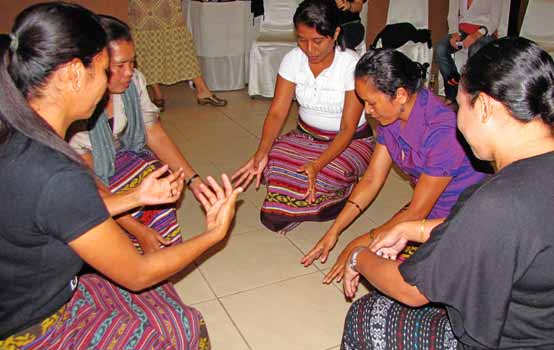

Choice
Making Strategic Choices about Where and How to Work
Given these dynamics, we adapted our approaches to play different roles in each country while sustaining the alliances we had built.
+ Read MorePhilippines: As participating activists began to use the neutral umbrella of, “JASS Network Philippines”, we played the role of bridge-builder to help build relationships with women across different political views because the women’s movement had been already very strong. Utilizing strategic relationships with key activists, such as Jojo Guan of the Center for Women’s Resources, JASS was able to gather activists who would otherwise never meet—a success, in and of itself. The organizations that make up JASS Network Philippines represent an impressive depth and breadth in terms of the networks, communities, and issues embodied.
Timor-Leste: While the young women were very passionate and motivated, the dominance of seasoned activists continued to be a barrier. Due to increasing conflict and lack of trust, we decided not to work deeply and instead Nani and Dina opted to work behind the scenes to provide mentorship and support for women in their own organizations, and to help diffuse and address tensions. In the meantime, we still provided opportunities for regional cross-solidarity networking and building with activists from other countries.
Indonesia & Cambodia: In Indonesia and Cambodia, we were seeing the kind of trust and solidarity emerging that is essential for effective organizing. Consequently, we sustained investments in building critical consciousness and shared analysis around power while also designing the processes to surface strategic opportunities where women could mobilize influence together.
Malaysia: In Malaysia, we decided to support and accompany the activists’ own processes by providing our methodologies and expertise as requested and needed.
Change
JASS’ Alternative Political Spaces: Spawning Young Women’s Alliances and a Diverse Women’s Network
Young Women’s Alliances
Our ongoing leadership training, accompaniment and mentoring of young women was instrumental in the formation of three young women’s alliances in Cambodia, Indonesia, and Timor-Leste.
+ Read MoreCambodian Young Women’s Empowerment Network (CYWEN)
In 2010, following the national and regional leadership training processes, two of the young Cambodian women activists involved formed CYWEN to address the under-representation of women’s voices and issues in media and public debate. CYWEN is a network of over thirty diverse young women, including rural and urban women, factory workers, and women in formal jobs.
Forum Aktivis Perempuan Muda (FAMM Indonesia or Young Indonesian Women Activists’ Forum)
FAMM formed in 2012 as a network of 162 young Indonesian grassroots women who had participated in JASS Southeast Asia training processes since 2007. In the country’s increasingly repressive cultural climate, JASS’ capacity-building activities for young women leaders sparked and shaped a surge of young women’s activism and organizing. Today, the network consists of more than 350 organized and mobilized women and is a true testament to the value of investing years and resources into base- and trust-building.
Movimentu Feto Foinsae (MOFFE-TL or Young Women’s Movement Timor-Leste)
Despite the issues in Timor-Leste, young women formed a group in 2012 dedicated to fighting all forms of discrimination in all areas of women’s lives to achieve gender equality and justice. While we did not work deeply with this network, we still continued to offer support through accompaniment. This network is still alive today and continues to engage in our regional campaign—One Day, One Voice.
A Diverse Network
JASS Network Philippines
In the Philippines, women activists welcomed JASS as an honest broker—a regional Southeast Asian body that could operate as both insider and outsider, outside national tensions. JASS, as the international organization, also served as a key resource of local to global collective power. Filipino women activists defined and embraced JASS Network Philippines as an alternative platform that enabled them to deal with, and then put aside, past organizational and political differences in order to move forward. The network emphasized a multigenerational approach with attention focused on young women.
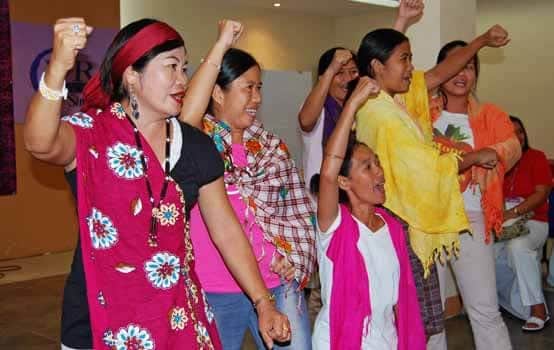 + Transcript/Transcripción
+ Transcript/TranscripciónI think JASS created a lot of spaces for me to keep myself involved – like power analysis. For me, it’s not only an analysis tool but also how to create your space, how to broaden your ideas, how to see myself and how to see others. It’s helped me to see I can make this space for me and for my friends. We also have a group to study together, and I also found out that in JASS they also give me a safe space to make me feel I can be anywhere, any person I want to be and still be accepted.
Young women directly feel the impact of many policies that aim to control their body, sexuality, political decisions, and economic conditions. By empowering young women, we ensure that the movement keeps progressing across different issues, organizations, and locations. We try to keep them involved with social activism because there are many young women who are giving it up. Young women can also contribute to generating knowledge that reflects our changing contexts. ~ Niken Lestari, FAMM Indonesia
Caja de herramientas
-
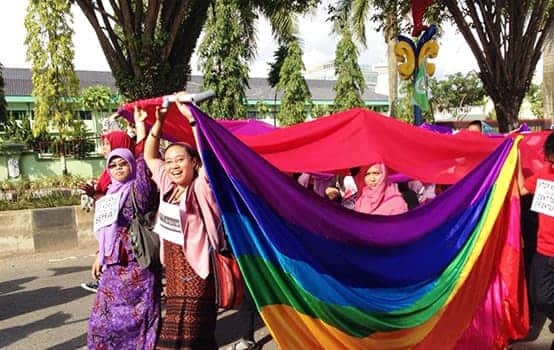
Challenge
Rising Fundamentalism and Repression
In Indonesia, because conservative Muslim leaders and agendas wield considerable influence on social norms and public policy, traditional ideas of ‘family values’, and what it means to be a “good Muslim woman”, dominate, which reinforces taboos on sex and sexuality. Those advocating for women’s and LGBTQI rights met pushback from all sides: families, communities, governments, and powerful Muslim clerics.
+ Read MoreIn Cambodia, there was a painful history of systematic violence against women and cultural pressures on young women to remain silent. Since the political changes that began in 2001, equality efforts had gained momentum and official endorsement, although the gap between rhetoric and reality remained wide. For example, freedom of expression, a critical ingredient for democracy and rights to flourish, was still limited. Criticism of the government often led to a backlash, including arrest and even death.
Choice
Safe Spaces for Young Women’s Leadership to Thrive
Safe spaces are a critical tool used by JASS SEA to incubate and strengthen young women’s leadership. To build solidarity and collectively strategize about the risks and challenges they face, women need safe spaces to break silence, feel connected, analyze power dynamics, and find common ground. Safe spaces are the foundation for political awareness, new organizing strategies, and the resilience that comes with strong solidarity and support.
+ Read MoreFAMM Indonesia brought together LBTQI, Muslim, rural, and indigenous women. Through participatory learning processes and activist trainings, FAMM helped women shift their mindsets and gain the confidence, knowledge, and skills to challenge prejudices and conservative narratives on subjects like sex and sexuality by educating and engaging their local communities. FAMM combined face-to-face learning and training activities with social media to support messages and activism across a range of boundaries—location, issue focus, partisan politics and religion. The embrace of LBTQI issues in this growing circle of predominantly Muslim women showed promise for challenging the hold of religious fundamentalism.
In Cambodia, where more than 70% of the population is aged 18 to 34, young women activists clearly are key to social movements. We have played a critical role in supporting CYWEN to create and protect spaces specifically for young women in a country where young people—especially women—had less status. CYWEN’s goal was to strengthen the activist skills and leadership capacity of young women to make young women’s issues more visible and central to the agendas of women’s and other social movements.
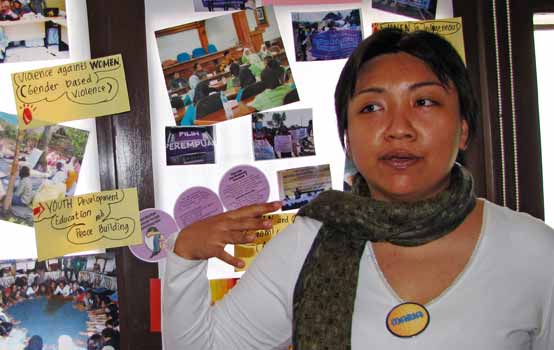
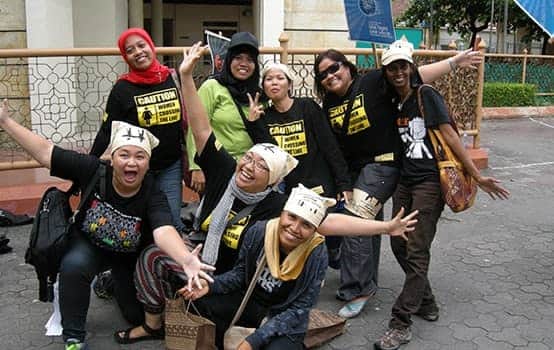
Change
Young Women’s Feminist Movements Breaking Grounds
The FAMM network grew quickly to include LBTQI, Muslim, farm and factory workers, indigenous, and women defending land and resources across 16 provinces. Initially focused on providing women with much-needed safe spaces for learning and dialogue, FAMM has evolved as a network for the political development of diverse young women activists – one that can mobilize action with other social movements around key demands at local and national levels.
+ Read MoreCYWEN has doubled its membership, recruiting young women activists from local NGOs and women’s organizations. While navigating a challenging context, members continue to use the network as a political home. CYWEN members have been invited into government–NGO dialogues as resource persons on violence against women, human rights, and gender equality, and have represented the country in regional civil-society gatherings. Today, the young women of CYWEN continue to use cross-sectoral dialogues to forge solidarity among diverse groups of Cambodian women. As Kunthea Chan, a key founding member of CYWEN exclaimed, “The Cambodian young women’s movement? It is starting now, with CYWEN.”
+ Transcript/TranscripciónI think it’s quite amazing as young women it’s very easy to find connection. They know how to develop their own solidarity, so it’s not the right terminology when you say, ‘how did you help?’ I didn’t really help, they did it themselves, and found how to connect each other. For instance, I could see a very fanatic one about sexual orientation and how they develop to become very close, they try to understand, they even try to protect the lesbian one. I didn’t really have time to learn why is that, but I think the underlying analysis, the space has already helped them as young women, to find we are together, they feel like whatever happened to you that’s also mine. It’s very easy for them to unite. And I think one factor, maybe, you should know, they trusted me and Nani. We didn’t have a hidden agenda here. We have passed all of these processes and we were so lonely. We were alone me and Nani and another lady out there, and we opened it up to them. And I think they really trust us and used the time to develop themselves.
I do believe that Cambodian culture and traditions are a form of invisible power that effectively influences everyone. If a woman speaks up against these traditions she will get a negative reaction from her family, neighbors, friends, and peers. Almost everyone, especially women, is particularly concerned about their safety and security in Cambodia nowadays, especially if they openly declare themselves as feminist activists after learning about their rights and start to claim these rights. ~ Yit Sophorn, CYWEN
Caja de herramientas
-
Challenge
Creating Sustained Cross-Country Solidarity
While we held periodic regional trainings, we hadn’t created sustained connection and solidarity across the countries, issues, ages, identities and constituencies. While Southeast Asian countries differ widely culturally, economically and politically, we wanted to find a way to spotlight the common challenges faced by women in the region.
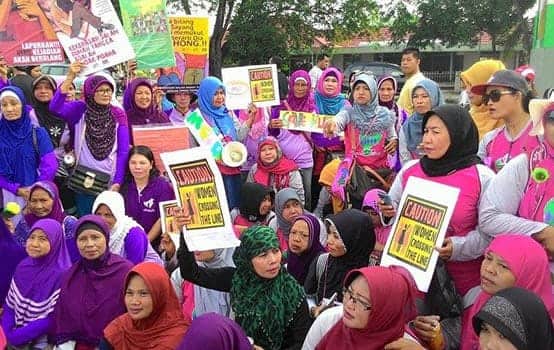
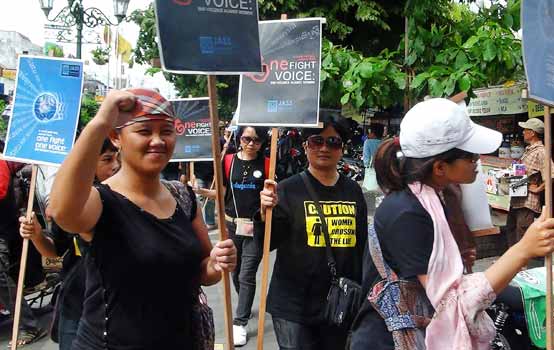
Choice
Creating a Regional Campaign with a Collective Voice & Identity
To foster a collective identity and voice, we decided to use the existing campaign of 16 Days of Activism against Gender-Based Violence. We mobilized women from our more than four years of leadership training for young, grassroots, LBTQI, poor and indigenous women in six countries. The campaign amplified a common issue with messages tailored to each specific context. When hundreds of women enthusiastically participated, we knew we had found a way to use social media to manifest collective voice and visibility.
+ Read MoreSubsequently, we launched One Day, One Voice (ODOV)—a now annual regional solidarity campaign that serves as a platform for coordinated, multi-country organizing. The campaign organizes synchronized activities under the leadership of JASS SEA allies in Cambodia, Indonesia, the Philippines, Malaysia, Timor-Leste and Thailand to effectively spotlight marginalized women’s issues and agendas across the region. During the campaign, JASS SEA and our allies share social media memes, blogs and videos on a political theme and organize discussions and street actions across six countries.
Change
A Regional, Grassroots Campaign Is Born
The success of One Day, One Voice (ODOV) has only grown. Across the region, young activists have organized thousands of other women to participate in dialogues, demonstrations and marches—a huge testament to the potential of local-to-regional organizing.
+ Read MoreIn 2014, ODOV started spotlighting the situation of women human rights defenders (WHRDs) and state violence through the theme “Justice for All Women Human Rights Defenders!”, spotlighting the increasing cases of arrests, criminalization, fabricated charges, harassment, and even killing of WHRDs in the region. In 2017, ODOV centered on rising authoritarianism, right-wing populism, and militarism in Southeast Asia. In 2018, using the theme “We are all Defenders”, we featured the resistance and safety strategies that Southeast Asian women activists are devising amid the growing risk and threats.
Not only does ODOV mobilize thousands - over 16,000 by 2018 - it reaches other groups of activists with whom we do not work directly. Holding ODOV during the 16 Days of Activism—a widely recognized annual campaign—strategically garners more visibility as well as solidarity from people around the world fighting for justice.
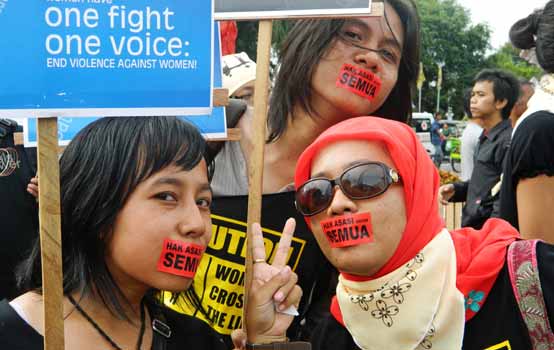 + Transcript/Transcripción
+ Transcript/TranscripciónOne Day, One Voice is important for us women in the Southeast Asian region because it is an opportunity for us to voice against tyranny, militarism, foreign intervention, misogyny, fundamentalism, and all other concerns that threaten our human rights. This is a moment for sisterhood and a space for solidarity.
One Day, One Voice campaign is organized by JASS Southeast Asia. To me, it’s an important campaign to speak up together to end violence against women, and protect women’s rights. But not only me: all of us, men and women must protect women’s rights. And I think that we are not late, and we should not wait. We make it happen! Please remember that we are all defenders! ~ Monirath Prak, CYWEN
Caja de herramientas
-

Challenge
The Criminalization of Women Human Rights Defenders (WHRDs)
As in many places in the world, Southeast Asia women activists were (and continue being) increasingly harassed, stigmatized, raped, jailed and even killed for speaking out, and their organizations and networks faced new restrictions and laws (e.g. the Law on Associations and Non-Governmental Organizations or LANGO in Cambodia and the Law on Mass Organizations or Ormas Law in Indonesia). Those most at risk were indigenous and rural women leaders fighting to defend their land, rights and territories from multinational companies.
Choice
Confronting the Backlash against WHRDs
JASS Southeast Asia made the struggle of women land and territory defenders the core of our agenda, honoring courageous women activists in prison through a series of social media campaigns, art performances, media events, peace marches, dialogues, bazaars, film screenings, and lantern lightings in Cambodia, Indonesia, Myanmar, Thailand, Timor-Leste and the Philippines.
+ Read More- In the Philippines, we joined the call for the release of GABRIELA community organizer Miradel Torres and peasant organizer Andrea Rosal. And in 2018, when the Philippine Department of Justice (DoJ) attempted to criminalize opposition activists and human rights defenders by labeling 649 citizens as terrorists (including UN Special Rapporteur on the Rights of Indigenous Peoples, Victoria Tauli-Corpuz), JASS SEA released a statement of concern and a feature article, both picked up by local and international media.
- In Indonesia, FAMM joined dozens of women’s organizations across Southeast Asia to mobilize global support for the release of Eva Bande, a member of FAMM imprisoned on and off since 2011 for peacefully organizing against the national palm oil corporations extracting resources and displacing her community. FAMM also provided emotional and economic support for her family.
- In Cambodia, we called for the release and appeared at court hearings for Kong Channtha, a land defender imprisoned for protesting forced eviction from a community surrounding Boeung Kak Lake in central Phnom Penh.
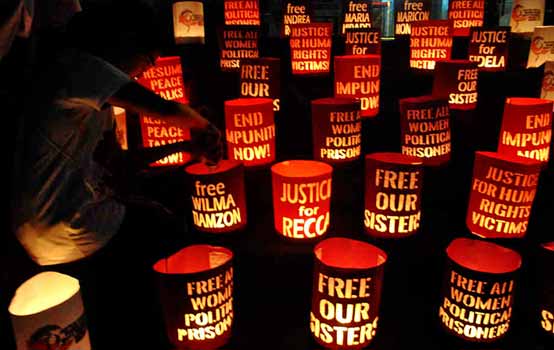
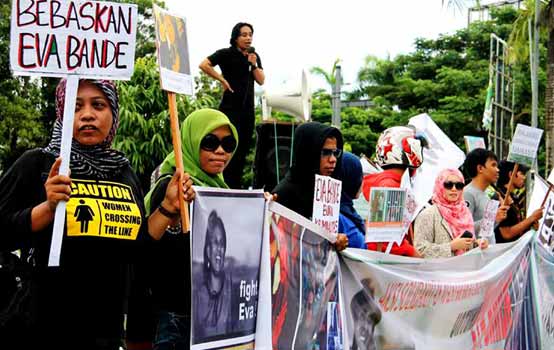
Change
Women Mobilizing for Rights, Resources, and Safety
After more than a decade of JASS’ accompaniment, the young women of FAMM and other JASS SEA partners are organizing in smart ways to build their capacity to make gains and speak out, such as:
+ Read More- A stronger, safer, and louder young women’s alliance. FAMM has turned itself from a network which offered safe spaces and training to young women activists, into a 350 member alliance (Muslim, LGBTQI, rural, and indigenous women) for political solidarity, collective voice and safety. It has emerged from the JASS’ movement-building processes as: (1) an ongoing safe space for mutual support and political education, and (2) a protection and solidarity network. FAMM members are using creative strategies to counter fundamentalist messages on sex, sexuality, and women’s roles.
- Deepened collaboration and capacity: Recently, JASS SEA entered a five-year partnership with Hivos and five local women’s organizations, including FAMM, to deepen the collaboration and political leadership of feminist organizations in Indonesia.
- Linking with the grassroots. The young women of CYWEN in Cambodia, have forged solidarity and links with women land rights activists such as Kong Channtha.
- Women political prisoners freed. All four of the Southeast Asian women political prisoners that JASS SEA, FAMM Indonesia, CYWEN, and allies from the Philippines campaigned for, have been freed. On the eve of International Human Rights Day (Dec.10) in 2014, newly-elected Indonesian President Joko Widodo pardoned Eva Bande. In early 2015, Kong Channtha and six other Cambodian land rights activists were released. In the Philippines, JASS allies led the campaign to release peasant organizer Andrea Rosal, who was freed in September 2015 after being cleared of criminal raps. GABRIELA member Miradel Torres was likewise freed in July 2019, with the false charges against her dropped.
+ Transcript/TranscripciónIn Indonesia now because of fundamentalism, and our government is not cooperative with us, with human rights issues, so the regional network is becoming our safety net. At the same time our national level network gives us more new ideas, like new ideas about Eva Bande. For example at first I thought what she needs is just litigation to be released from jail. But then I learned together as FAMM, as a women’s network, we learned that what she need is not only litigation, what she needs is also self-care, what she needs is to feel safe and her family to feel safe. That’s the best learning I got.
This is a source of strength for us. Our struggles, our months and years of campaigning for Eva Bande's release finally paid off. ~ Niken Lestari, FAMM
Caja de herramientas
-
Challenge
The Closing of Civic Space in the Region
Rising authoritarianism, militarism, fundamentalism, and extractivism in the region are driving escalating violence and destabilizing democratic institutions, undermining human rights safeguards, and closing civic space for activism and dissent.
+ Read MoreIn response, women have mobilized boldly to make their voices heard, demand justice, and offer alternatives to the status quo, in the face of repression in reprisal of their work. This is what we call the fifth trend: women’s resistance.
But resistance requires strategies for staying safe. And essential to safety is stronger solidarity and trust among women activists.
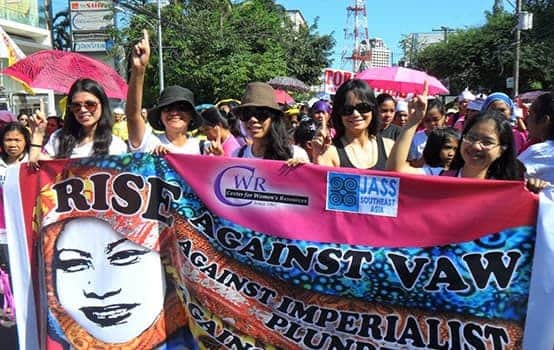
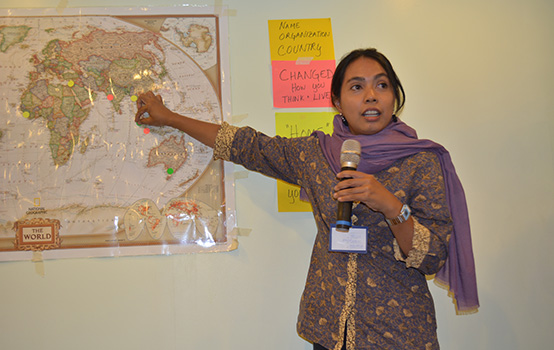
Choice
Strengthening of Regional and Country-Level Networks
The shifting context in the region has reinforced our mission – strengthening women’s collective power and safety to ensure that their leadership, voices, agendas and organizing are at the heart of justice and democracy struggles. Recognizing the importance of power (collective ability to make change happen) and safety (strategies that make it safe to fight for change), JASS is investing in a range of movement building processes - including country-level leadership workshops, cross-border and cross-movement gatherings, and strategic dialogues with women human rights defenders (WHRDs) and allies – to lay groundwork for the next wave of activist leadership and collaborative relationships and alliances.
+ Read MoreThe new four-year Women’s Voice and Leadership project in Indonesia aims to strengthen the capacity and collaboration among 5 diverse women's organizations and networks - from university campuses, rural villages, religious groups, lesbian, bisexual and transgender groups, and young activists - to strengthen the feminist movement in Indonesia to challenge repressive conservatism and political exclusion.
In Cambodia, JASS is using under-the-radar strategies and political education to support women garment workers’ activism within the labor sector.
In Myanmar, JASS is bringing together women in formal and informal sectors—garment workers, women farmers, and indigenous land defenders—to develop a shared political analysis as the basis for collaboration.
Regionally JASS SEA hosted a Defending Rights in Hostile Contexts gathering —part of a global series of related gatherings on rethinking human rights protection from a movement perspective. The gatherings bring grassroots activists into direct conversations with donors and NGOs— to deepen our collective understanding of current shifting power dynamics that have increased violence, attacks against defenders, and restrictions on civil society. And to explore how to better align regional, and global efforts with what local social movements and communities are doing to integrate protection into their ways of working.
Change
SEEDS SOWN, POISED TO GROW
After thirteen years of forming deep connections with over 500 women activists, and creating links with national and regional networks, JASS Southeast Asia has helped lay the foundation for a new generation of young women activists and feminist movement building. Our work in the region is currently focused on:
+ Read More- being grounded and working with young women outside of mainstream NGOs;
- playing the role of a “bridger”, bringing together women from very different backgrounds, movements and agendas;
- providing activist support through safe spaces that encourage mutual-care, learning and trust
- offering our power framework and analysis tools and spaces, a critical contribution at a time when changing global contexts mandate improved and reconfigured strategies; and
- equipping women with the skills and tools they need to be effective organizers and alliance builders.
With these, JASS hopes to contribute to the work of women organizing around issues of resources, land, health, gender rights, and economic justice. JASS seeks to help challenge conservative narratives and practices, and increase women’s voice, visibility, and influence in strategic spaces from local to global. JASS aims to develop, with our allies and partners, shared “what women want” demands and recognize women’s individual and collective potential to move agendas forward and push for alternative solutions. Lastly, JASS hopes to have built and strengthened cross-movement and cross-border networks to support women’s organizing work in restrictive contexts.
 + Transcript/Transcripción
+ Transcript/TranscripciónIn this new stage of work, we will be focusing our impact in strengthening country level work. This involves political education and accompaniment to deepen analysis, practice and shared strategy. This will be our anchor in our regional engagement, both as movement support, and as a resource for feminist movement building and community-based collective protection. We will be seeing an emergence of young feminist leaders, with strengthened collaboration and movement organizing strategy across sectors and borders. The increasing rise of conservatism and strong authoritarian regimes in collusion with corporations and religious institutions criminalizing women human rights defenders and LBT activists at the frontline is the context in which our region is continuing to navigate. This presents both a challenge and an opportunity. The challenge is how to build strategies that effectively navigate the risk, but be able to effectively address and support organizing needs in communities. The moment also creates opportunities to work beyond the usual networks. It enables us to expand the depth and breadth of what we can achieve if we work together.
A while ago, I saw myself as the seed and I grew with FAMM. We grow together and become a tree with strong roots. The tree produces another seed and becomes another tree…. We are always growing and becoming trees that produce more seeds. ~ Pipi Supeni, FAMM member
Caja de herramientas
-
Khmer tradition dictates that women should just stay at home. Studying in school and joining social actions and political activities are often discouraged. Historically, women have been discriminated against so much so that women themselves think that the only thing they should really be good at is cooking rice. My passion is to make women themselves realize that they should get involved in politics, excel in what they do, be confident and brave, and claim their rightful place in society... even if it takes being behind these prison bars to prove this point. ~ Kong Chantha, Cambodia
+ Transcript/TranscripciónMovement building is very important because we can not reach change in women’s lives only by changing policy because, especially in our region, we understand that there are already policies and international frameworks that have been ratified, but it doesn’t change women’s lives. Women’s status in this region is still very low, their quality of life is very low. So to change women’s lives - of course policy is important - but it should be social movements, it should be a collective energy and collective power that women actually have to really change their lives sustainably, so that they are enabled to really face challenges in their lives which are always changing. So the movement building process actually creates the space and opportunity for women to empower themselves and build collective power to face the different kinds of power which are always changing and coming into their lives. So that’s why movement building is very important - it is not only getting women together to do something, it really changes their perception, changes the way they think and also then influences bigger changes in the world.
I am a young advocate for women's rights. Yes, I may seem a novice to some, though I know in myself that I am no less capable in fighting for gender equality. I know that I am not alone, that there are others like me, young women, who replenish and continue this struggle... 'There has never been nor will there ever be real freedom as long as there is no freedom for women.' ~ Mikas Matsuzawa, the Philippines
+ Transcript/TranscripciónI think I’ve changed a lot. I’ve changed the way I’m thinking, the way I like to change society, also especially my leadership, I try to use the framework of leadership and apply it to my daily work and my life. I start to connect between my personal life and the theory of feminist leadership and try to apply it in a way that I think this is really useful for what is going on.
If you are an activist, a movement person, it doesn’t matter where you are. JASS wants to invest in leadership of women who can really build a movement to make change, rather than form NGOs or a network. JASS wants to create a space where you – young and energetic, with a vision – can build your character, leadership, capacity to contribute to change. ~ Nani Zulminarni, PEKKA, Indonesia
+ Transcript/Transcripción[Why is movement building important?] Because you can’t turn back, you should move, if you need to change you should move. You can’t sit and not be active at all. No waiting for change. You should even [move] faster than others to change things for better. I don’t have any big concept on that, but for me movement is very important and I always act on grassroots, because I believe in grassroots movement.
Feminism and movement building is new for Cambodia. In Cambodian culture, they draw the line for the woman that you can’t do anything for what you want or want to do. So that’s the reason that I want to see those young women really understand and get out of the box and be who they want to be. But also to be the people that really are a resource to society, who could lead the change for Cambodia to be a better country and society, so that the men and women could be equal and they are both part of the political change as well. ~ Kunthea Chan, JASS SEA, Cambodia
+ Transcript/TranscripciónMovement building is not instant. It will take quite some time even long time and involve lots of dimensions. It is not linear, we get near achievement but there is backlash. And then never give up, and never feel tired about it. We should really make it our life, it is not a job, it is really life, struggle in life. I don’t think it will stop at some point. As long as there are always inequality and discrimination against women and inequality in power relationships we have to keep moving.
Back to Top
Archives
- Our Rights, Our Safety: Resources for Women Human Rights Defenders (English, Bahasa, Thai)
- Between a Rock and a Hard Place: Women, Power, and Challenge in Southeast Asia
- Solidarity, Safety and Power: Young Women Organizing in Indonesia
- Defending Rights: Understanding and Confronting the Context in Southeast Asia